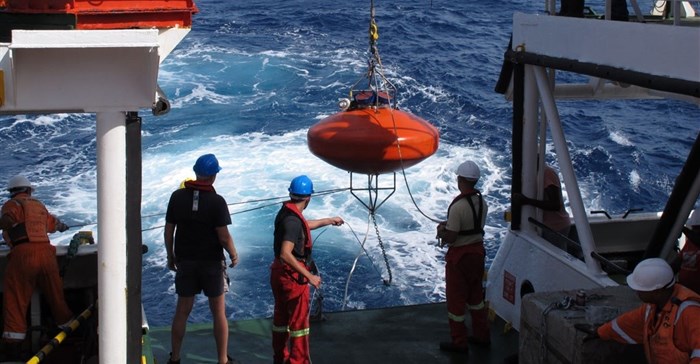The South African Environmental Observation Network (SAEON) has launched the Agulhas System Climate Array (ASCA) project to coincide with the closure of the first ASCA deployment cruise.
The launch took place at the Institute for Coastal and Marine Research at the Nelson Mandela Metropolitan University in Port Elizabeth. The project is launched in partnership with the Department of Environmental Affairs' Ocean and Coasts.
The aim of the project is to showcase the benefits of this very large monitoring array in terms of climate research and long-term monitoring, as well as the value of scientific collaboration at the inter-governmental department level, between universities and science groups.
ASCA is an international oceanographic project with partners from South Africa, the US and the Netherlands. ASCA is designed to provide long-term observations of Agulhas Current volume, heat and salt transport and its variability from meso-scale (eddies), through seasonal to inter-annual time-scales. The ASCA shelf and tall moorings will extend 200km offshore through the core of the Agulhas Current, with current and pressure recording inverted echo sounder measurements extending the array to 300km offshore.
Vital role
The Agulhas Current system plays a vital role in regional weather, with mean summer rainfall along the east coast related to the distance to the Agulhas Current core, as well as impacting the local biodiversity. It also critically contributes heat and salt to the Thermohaline Circulation, and thus impacts on climate variability and climate change.
The baseline study that the ASCA project provides will contribute to Operation Phakisa (Sesotho for "hurry up"). This project aims to assess how the ocean can be used to promote the South African economy.
ASCA will contribute to the initiative by providing knowledge as to how the Agulhas Current impacts marine transport, as it dominates the east coast of South Africa, and the marine protection services and governance in terms of providing data on current and temperature variability on the impacts downstream of marine protected areas and critically endangered ecosystems.
Mooring deployment
The first ASCA mooring deployment cruise that took place on board the South African research vessel Algoa in April 2015, saw the two shelf moorings and the first four tall moorings successfully deployed. These activities were complemented by a range of surveys along the full ASCA transect.
Due to favourable sea conditions, the mooring deployment cruise was smooth sailing. The four tall moorings and two shelf moorings were successfully parked in their rightful place on the sea floor, where they will diligently start logging data. The moorings will again be visited and retrieved in a year's time, for downloading of data and replacing of batteries.
In addition, seven surface drifters donated to SAEON by the South African Weather Service were deployed. The drifters consist of a floating ring, to which a 'sock' is attached that catches the current. A transponder in the drifter sends a position update every half hour to the National Oceanic and Atmospheric Administration in the USA where the positions are logged.




































